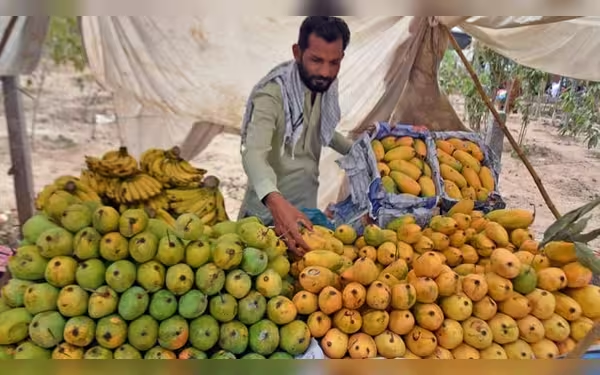Thursday, July 4, 2024 05:54 PM
Mango Research Institute Warns of Decline in Pakistan's Mango Industry
- Rising temperatures and inadequate rainfall threaten Pakistan's mango harvest
- Recommendations from MRI include irrigation strategies and pest management techniques
- Challenges faced by Pakistan's mango industry underscore the need for adaptive strategies
 Image Credits: Geo.tv
Image Credits: Geo.tvPakistan's Mango Research Institute warns of potential decline in mango industry due to climate change. Recommendations include irrigation strategies and pest management to enhance resilience.
Pakistan's renowned mango industry is facing a potential decline in the upcoming season, as warned by the Mango Research Institute (MRI) in Faisalabad. The combination of rising temperatures and inadequate rainfall poses a significant risk to the country's mango harvest. With 1.75 lakh hectares dedicated to mango cultivation, Punjab stands out as the leading region with 1.14 lakh hectares under mango cultivation. Pakistan's annual mango production stands at 2 million metric tons, with Punjab contributing 1.3 million metric tons. Despite its significant production, Pakistan ranks 7th globally in terms of mango cultivation area.
The extreme weather conditions, particularly the soaring temperatures exceeding 40 degrees Celsius during the critical flowering period in March, are causing distress among mango growers. To address these challenges, the MRI has recommended specific strategies. Growers are advised against using equipment that may disrupt moisture levels in orchards, essential for mango growth. It is recommended to maintain shorter irrigation intervals, ideally every 10-12 days, and adhere to a weekly watering schedule for young mango trees. Pest management is crucial, especially with the increased susceptibility to thrips and mites during drought conditions. In case of infestation, growers are urged to seek guidance from local agronomists for effective solutions.
To boost natural immunity, the MRI suggests refraining from cutting grass and plants in orchards during the summer months. Additionally, spraying a 1 to 2 percent solution of soluble potash can aid in strengthening plant resilience against adverse environmental factors.
The challenges faced by Pakistan's mango industry due to climate change highlight the importance of implementing adaptive strategies to safeguard future harvests. By following the recommendations provided by the Mango Research Institute, growers can enhance their resilience against adverse weather conditions and pest threats, ultimately ensuring the sustainability of Pakistan's mango production. It is imperative for stakeholders to prioritize sustainable practices and seek expert guidance to overcome the challenges posed by changing climatic conditions.













